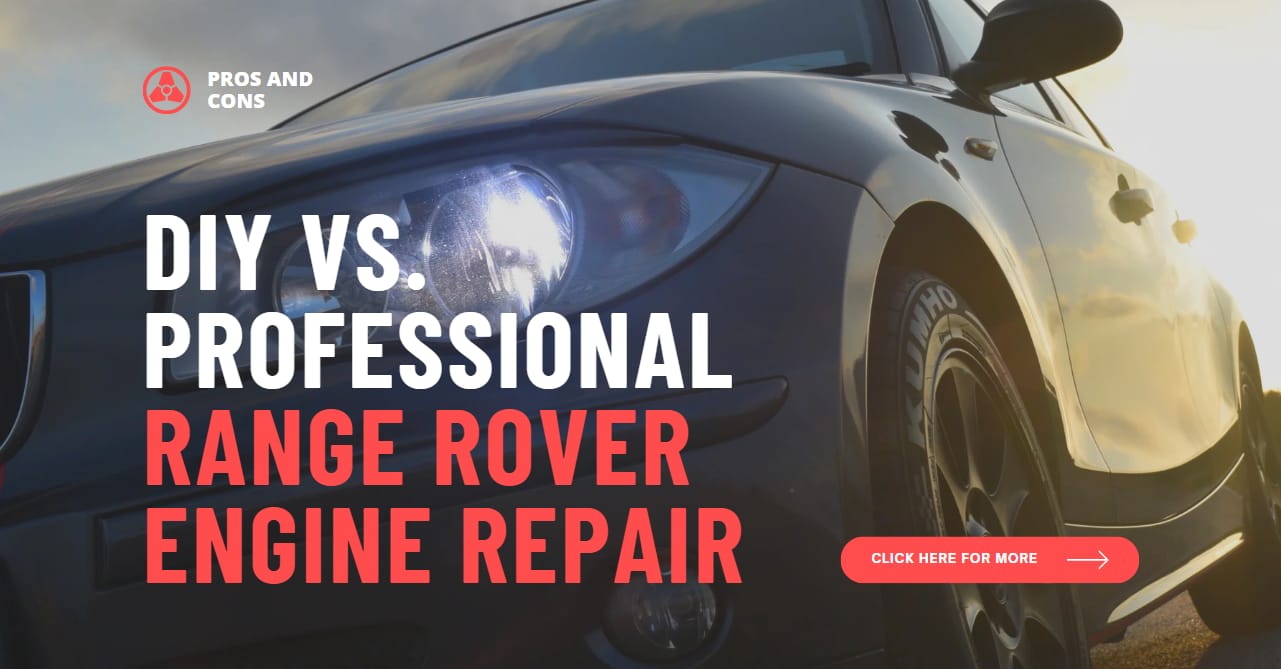When it comes to maintaining and repairing a Range Rover, engine issues can be particularly daunting. For many vehicle owners, the decision to tackle repairs themselves or to seek professional help can be challenging. In this article, we’ll explore the pros and cons of DIY vs. professional Range Rover engine repair, helping you make an informed decision based on your needs and expertise.
DIY Range Rover Engine Repair: Pros and Cons
Pros:
- Cost Savings: One of the most appealing aspects of DIY Range Rover engine repair is the potential for cost savings. By performing repairs yourself, you can avoid labor costs charged by professional mechanics, which can be significant, especially for complex engine issues.
- Learning Experience: Engaging in DIY repairs allows you to gain hands-on experience and a deeper understanding of your vehicle’s engine. This knowledge can be valuable for future maintenance and repairs, potentially saving you money in the long run.
- Flexibility: DIY repairs offer flexibility in terms of timing. You can work on your vehicle at your own pace and schedule, avoiding the need to book appointments or wait for a slot at a repair shop.
- Personal Satisfaction: Successfully completing a DIY repair can be incredibly satisfying. The sense of accomplishment from fixing your vehicle can be a rewarding experience for many car enthusiasts.
Cons:
- Risk of Mistakes: Without proper experience and tools, there is a risk of making mistakes that could lead to further damage. Engine repairs require precision and expertise, and errors can result in more costly problems down the line.
- Time-Consuming: DIY repairs can be time-consuming, especially if you encounter unexpected issues or lack the necessary tools. What might start as a simple fix can quickly become a complex and lengthy project.
- Limited Access to Parts: Obtaining specific parts for a Range Rover engine repair can be challenging. Professional repair shops have access to a wide range of genuine parts and can source them more efficiently than individual DIYers.
- Potential Warranty Issues: Performing repairs yourself might affect any existing warranties on your vehicle. It’s essential to check the terms of your warranty before undertaking significant repairs to avoid invalidating it.
Professional Range Rover Engine Repair: Pros and Cons
Pros:
- Expertise and Experience: Professional mechanics have specialized training and experience in Range Rover engine repair. They are equipped to diagnose and fix issues accurately, reducing the risk of further damage.
- Access to Specialized Tools and Parts: Repair shops have access to specialized tools and genuine parts that may not be readily available to DIYers. This ensures that repairs are conducted with the right equipment and components.
- Time Efficiency: Professionals can often complete repairs more quickly than an amateur, thanks to their experience and access to tools. This can minimize downtime and get your vehicle back on the road sooner.
- Warranty Protection: Repairs performed by certified professionals often come with a warranty on both parts and labor. This provides peace of mind and protection against potential future issues related to the repair.
Cons:
- Higher Costs: Professional Range Rover engine repair typically comes with higher costs due to labor and parts. The convenience and expertise come at a price, which can be substantial depending on the nature of the repair.
- Less Personal Control: When opting for professional repairs, you relinquish some control over the process. You’ll need to trust the technician’s expertise and may have limited insight into the details of the repair work.
- Potential Wait Times: Depending on the repair shop’s schedule, you might face waiting times to get an appointment or have your vehicle serviced. This can be inconvenient if you need urgent repairs.
- Communication Barriers: There can sometimes be communication barriers between you and the repair shop. Misunderstandings about the scope of the repair or the expected costs may occur, leading to frustration.
Conclusion
Deciding between DIY and professional Range Rover engine repair depends on various factors, including your mechanical expertise, the complexity of the issue, and your budget. DIY repairs can offer cost savings and personal satisfaction but come with risks and potential complications. On the other hand, professional repairs provide expertise, efficiency, and warranty protection, albeit at a higher cost.
For many vehicle owners, a combination of both approaches might be the most practical solution. Simple maintenance tasks can be tackled DIY, while more complex repairs are best left to professionals. Whichever route you choose, understanding the pros and cons of each option will help you make the best decision for your Range Rover engine repair needs.







